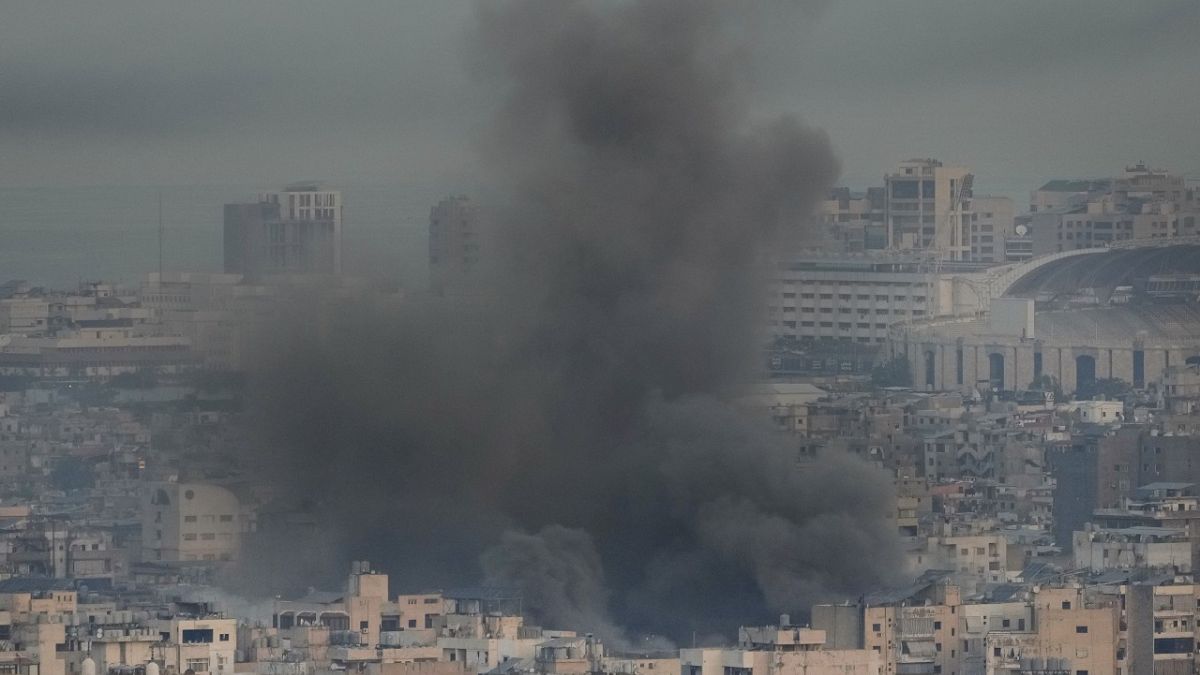Israeli airstrikes pounded areas across Lebanon, killing at least 27 people on Wednesday, while UNIFIL says Israeli troops fired at their watchtower in southern Lebanon.
Israeli airstrikes across southern Lebanon and its capital Beirut killed 27 people on Wednesday, officials said.
In Nabatiyeh, in southern Lebanon, more than half a dozen strikes hit the city and surrounding areas, according to Lebanon’s Health Ministry, which said 16 people were killed and 52 wounded. The city’s mayor, Ahmad Kahil, was among those killed, according to provincial governor Huwaida Turk.
Lebanon’s caretaker prime minister, Najib Mikati, meanwhile accused Israel of “intentionally targeting” a municipal council meeting to discuss relief efforts in Nabatiyeh. The Israeli military claimed it targeted Hezbollah command centres and weapons facilities that had been embedded in civilian areas.
UNIFIL says Israeli tank fired on a mission watchtower
The United Nations peacekeeping mission says Israeli troops fired at their watchtower in southern Lebanon. This comes as international criticism grows of Israel’s reported targeting of UNIFIL peacekeepers over the past days.
“Yet again we see direct and apparently deliberate fire on a UNIFIL position,” the peacekeeping mission, known as UNIFIL, said in a statement Wednesday.
“This morning, peacekeepers at a position near Kfar Kila observed an IDF Merkava tank firing at their watchtower. Two cameras were destroyed, and the tower was damaged,” UNIFIL said.
On Sunday, UNIFIL said Israeli troops “forcibly entered” a UNIFIL position near the village of Ramia, crossing the UN-mandated Blue Line with two tanks. Israeli troops later fired smoke rounds near peacekeepers, leaving 15 personnel suffering from skin irritation and gastrointestinal issues.
UNIFIL also reported that Israeli troops obstructed a critical logistical movement near Mays al-Jabal on Saturday.
“We remind the IDF and all actors of their obligations to ensure the safety and security of UN personnel and property and to respect the inviolability of UN premises at all times,” the peacekeeping mission said.
Humanitarian crisis in northern Gaza remains dire
The top UN humanitarian official is accusing Israel of blocking the delivery of desperately needed aid to Gaza, saying there is barely any food left in the north where an Israeli offensive is underway.
Acting humanitarian chief Joyce Msuya told an emergency meeting of the UN Security Council Wednesday that no food entered northern Gaza from 2 to 15 October, “when a trickle was allowed in.”
“All essential supplies for survival are running out,” she said. “There is now barely any food left to distribute, and most bakeries will be forced to shut down again in the next several days without additional fuel.”
Throughout Gaza, Msuya said, less than one third of the 286 humanitarian missions coordinated with Israeli authorities in the first two weeks of October “were facilitated without major incidents or delays.”
She said the level of suffering and reality in Gaza is brutal and worsens every day as Israeli bombs fall, fierce fighting continues and “supplies essential for people’s survival and humanitarian assistance are blocked at every turn.”
The US ambassador to the United Nations told an emergency meeting of the UN Security Council Israel must do more to address “the intolerable and catastrophic humanitarian crisis in Gaza” adding that the United States will be watching its actions on the ground.
Linda Thomas-Greenfield referred to the recent US warning to Israel to allow more aid in or risk losing weapons funding in her address Wednesday.
She acknowledged that two dozen aid trucks have entered northern Gaza — where an Israeli offensive is underway — for the first time in several weeks. But she stressed that progress since last week has been “insufficient,” Israel must follow through on its commitments, and only actions on the ground “will bring real progress.”
“A ‘policy of starvation’ in northern Gaza would be horrific and unacceptable and would have implications under international law and US law,” Thomas-Greenfield warned. “The government of Israel has said that this is not their policy, that food and other essential supplies will not be cut off, and we will be watching to see that Israel’s actions on the ground match this commitment.”

